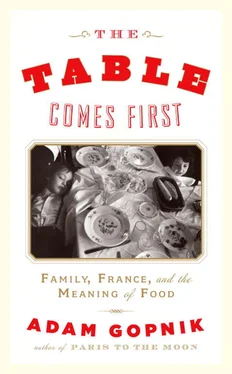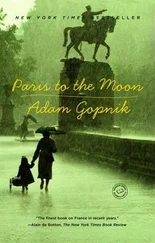The morning after the Fooding event in Queens, I submitted this analogy to Alexandre during a walk, and he allowed that there might be something in it. He was shining with delight at the success of the launch, and was already making plans for new campaigns in France and America. He told me that he had begun work on a bande dessinée —France is a place where the adult comic book is a major vehicle for communicating information and emotion—that would expose the history of clandestine right-wing propaganda in French food writing. (It’s true that French food writing has tended to be reactionary; the most famous French food writer of the past century, Robert Courtine, was revealed to have been an active anti-Semitic collaborator with the Vichy regime.) Alexandre goes further. Even Brillat-Savarin’s far more liberal and famous definition of gastronomy’s aim—to regulate and fix limits for appetite—is, he thinks, touched by a panicky need for control. “Think how we would feel if we used the same words for the study of sex!” he exclaimed. “To regulate and fix the limits of it! Our role is to work against that tradition: to open minds, to reveal history, to change views. It should be a movement of the young.”
The most recent Fooding guide is in a way the most provocative. Nearly all the Michelin three-star restaurants have been dropped completely, there are passages in English, and, most important, a couple of new chefs have been identified who can fairly be called revolutionary: Adeline Grattard, of Yam’Tcha, on the Rue Sauval, who has invented a Sino-French fusion cuisine rooted largely in steaming and teas; and, still more revolutionary, Gregory Marchand, a young Frenchman who trained in New York and London—an unthinkable notion twenty years ago—and whose restaurant, on the Rue du Nil, is actually called Frenchie. The next Fooding event in New York, promised for September, would be, instead of once again a Franco-American conversation, a match, even a confrontation, between San Francisco and New York chefs. “We don’t want to be narrowly identified as a ‘Franco-Français’ movement, just bringing French chefs to America,” Anna confided recently. “Then we might as well be part of the French cultural ministry.”
Alexandre is particularly glad to be coming back to New York. “I grew up watching American movies,” he said the morning after the Fooding event in Queens. “America still feels so young to me. I love New York. I still see things like Momofuku that are entirely of New York. Can we make that kind of place in France?” He mused for a moment, and then brightened.
“Do you know a film I love?” he asked. “ Tarzan’s New York Adventure . Do you know it? With Johnny Weissmuller? And that scene when he leaps from the Brooklyn Bridge?” His hand moved through the air, Tarzan jumping from the bridge. “I love that moment. It’s an important moment for me. It seems so, so romantic.”
16. E-MAIL TO ELIZABETH PENNELL: Salmon, Broccoli, Repentance
Dear Mrs. Pennell:
Tonight I shall make my repentance meal, my remorse meal: salmon and broccoli with brown rice. It’s the one meal I do when I am feeling guilty about all else I’ve been doing. For of course, despite all my brave talk about the relativity of taste, for all that I can reference the whirligig of fashion and the inevitability of alterations in likings, the truth is that I am as much a captive of my time’s tastes and taboos as anyone. I make cream sauces, but I feel rotten about them afterward. Guilt rises in my craw as I contemplate a beefsteak, whatever brave things I may say about the scavenger ethic, and so I believe in the holy-healthy trinity of wild salmon and organic broccoli and brown rice. It is a plate that tastes like forgotten virtue. It is the right dinner for a moment of shame.
And all this remorse, this penitence, this doubt, is directed, or occasioned, anyway, by what now seems to be my misguided romance with you , Elizabeth. The bad habit of the strategist is to go one bridge too far, and the worst vice of the overeducated is to read one book too many. It is a form of hubris: wiser to find something good, enjoy it, and not contaminate it by searching too much further. Do not discover Carlyle’s politics, or Scott Fitzgerald’s parenting, or Philip Larkin’s taste in porn. It will screw you up to no good purpose, and diminish the writer without adding to your understanding. I know this, and should have quit while I was ahead.
You see, I found the book you wrote upon your return to Philadelphia in 1904. It was full of life. Like me, you have and keep a warm appreciation of the beauty of old Philadelphia—its grid, so neatly laid out in inward-looking streets and squares with none of the relentlessness (nor the dynamism) of New York’s less perfectly ordered plan. The Schuylkill city’s spaciousness, its slight air of eighteenth-century clarity and red-brick virtue. You love all that, too, and I read all that with pleasure.
And then I found within your book a line of stark, vigorous bigotry directed not just at the undeserving but at—well, directly at me , or, rather, at my not-so-distant great-grandparents, who were among the Russian Jews who had since your youth taken over the center city of Philadelphia. And what possessed you was not mere social bigotry, but real animus. “I cannot understand, and no one can explain to me, why the Russian Jew has been allowed to push his way in [to the city],” you write. “I have heard all about his virtues; nobody need remind me of them; I know that he is carrying off everything at the University so that rich Jews can begin to think in turn that they should in return make it a gift or a bequest, as no rich Jew has yet, I believe. I know that the young Philadelphian must give up his sports and his gaieties if he is to compete with the young Russian Jew who never allows himself any recreation on the road to success—I might add the fact that the Russian Jew has mastered, in a very short time, the possibilities of bankruptcy and arson.”
What particularly offends you is the presence of Russian Jews, like my great-grandparents, on the legendary inner, tree-named streets of the city, Chestnut, Walnut, Spruce, and Pine. “The tragedy is that the Russian Jew should have descended upon just this section, should now, not so much dispute it with him [the old Philadelphians] as oust him from it—the Russian Jew, a Jew by religion but not by race, who has been found impossible in every country on the continent of Europe onto which he has drifted, so impossible that when that country is Holland that the Jews who have been there for centuries collect among themselves the money to send him post-haste on to England and America….” More, and then more, the old and usual ugliness, and with the usual much-rehearsed and patently insincere exceptions: The old, original Jews of Philadelphia were all right in their place.
This is, of course, in one way the standard anti-Semitism of your place and time and circumstance. Henry James shared it, and for the same reasons, and expressed it in almost exactly the same way: the Jews who had filled the Lower East Side seemed to him as remote from his ideas of Americanness as the Russian Jews on Spruce Street seem to you. I know that. I can tell myself what is true, that this bigotry was the bigotry of your people and your time, to be found in Henry Adams, too, and for the same reason: like Henry James, he had grown up in one America, and found himself in what seemed to be another one, very different and disconcerting. These are the standard-issue attitudes of the Old Americans of the East Coast cities confronted with the new immigrants, and they go on to this day, when the Old Americans are often the descendants of the original obnoxious immigrants.
Читать дальше












